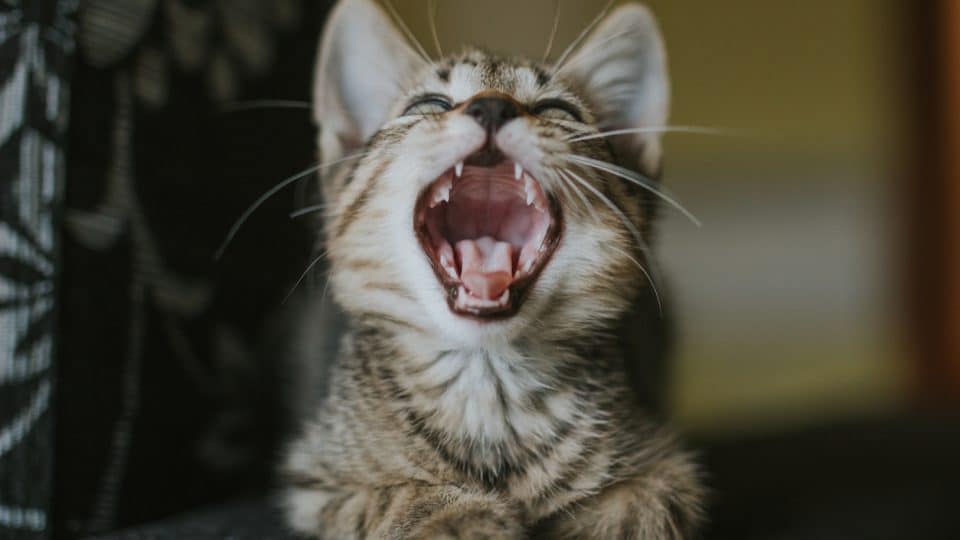Teeth grinding, or bruxism, is a common behavior seen in cats. In most cases, it’s triggered by dental problems or oral pain. Affected cats will move their jaw from side-to-side or up-and-down, often alongside sounds like scraping, clicking, or chattering. Teeth grinding is as frustrating for your kitty as it is worrying for you—but there are ways to treat this condition.
Like humans, cats develop two sets of teeth in their lifetime. Unlike humans, cats are obligate carnivores—their nutritional needs are met by eating mostly meat—with teeth better suited to tearing and shredding than grinding. If you notice your cat is grinding their teeth, it’s wise to get in touch with your vet. With their help and some lifestyle changes, you can curb this unpleasant behavior.
Causes of Cat Teeth Grinding
Most of the time, bruxism is set off by an underlying medical condition. Thankfully, once you’ve identified the likely cause behind your cat’s teeth grinding, the behavior can be stopped. Here are some of the most common causes of teeth grinding in cats.
Tooth problems
Dental issues account for the majority of feline teeth grinding, and include:
- Cavities: Cats may grind their teeth to ease the pain of a cavity. Cavities frequently coincide with vocalization, pawing at the mouth, refusal to eat, bad breath, and drooling on one side of the face.
- Tooth resorption: When the dentin of the tooth erodes (the hard tissue beneath the enamel) it can cause pain, bleeding, difficulty eating, and salivation. More than 50% of cats will experience this hard-to-spot condition, and many will grind their teeth as a way to self-soothe.
- Objects stuck in teeth: Teeth grinding could be your cat’s attempt to dislodge something stuck between their teeth—all the more reason to make regular tooth-brushing a part of your kitty’s routine.
- Feline dental disease: Bacteria-harboring plaque can lead to gingivitis or inflamed gums. Left untreated, this condition can escalate to periodontitis, which is irreversible. Both diseases cause swelling, redness, pain, and bleeding around the gum line. Many afflicted cats are reluctant to eat, and some will tilt their head in an unusual way while eating.
- Mouth ulcers: Typically caused by untreated gum disease, ulcers are painful and may cause bruxism as a result. Watch for discomfort and vocalization when your cat yawns or tries to pick up food, as well as bad breath, drooling, and trouble swallowing.
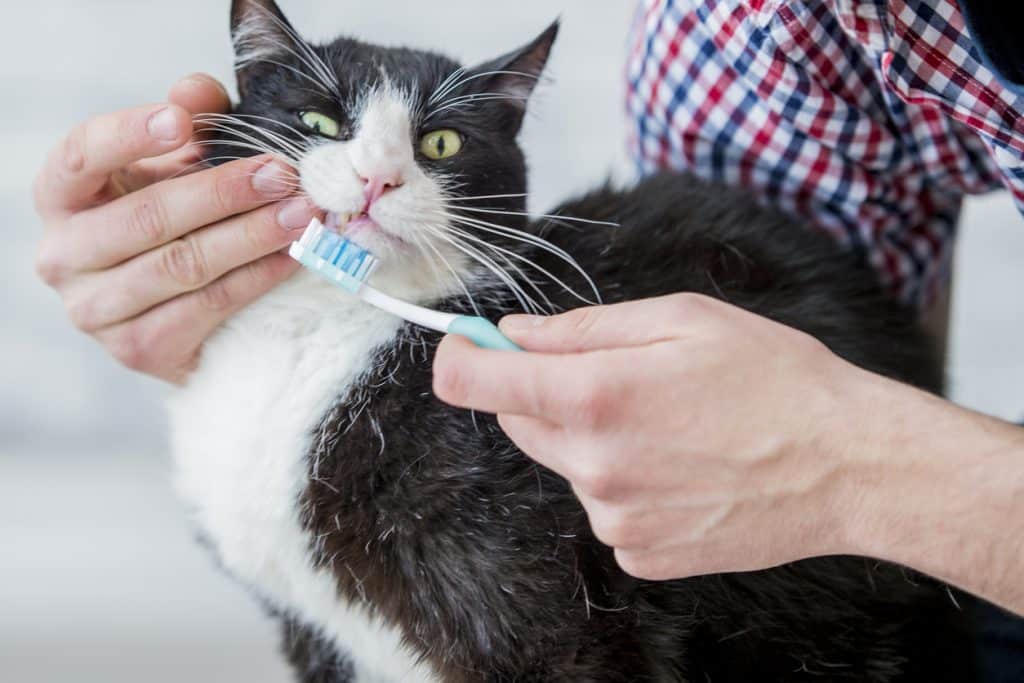
iStock/FatCamera
Growth spurts can cause misaligned jaws from
As kittens switch from mother’s milk to solid foods, they experience a growth spurt in their lower jaw. If a cat’s baby teeth develop too early it can hinder this growth, causing an over- or under-bite that can result in teeth grinding. Cats with misaligned teeth may have trouble chewing and picking up food. This most commonly affects flat-faced breeds, like Persians.
Acid reflux
When stomach acid comes back up the esophagus, it creates excess saliva and discomfort, and sometimes this triggers teeth grinding. Signs that point to acid reflux include regurgitation, swallow attempts, pain, depression, and anorexia.
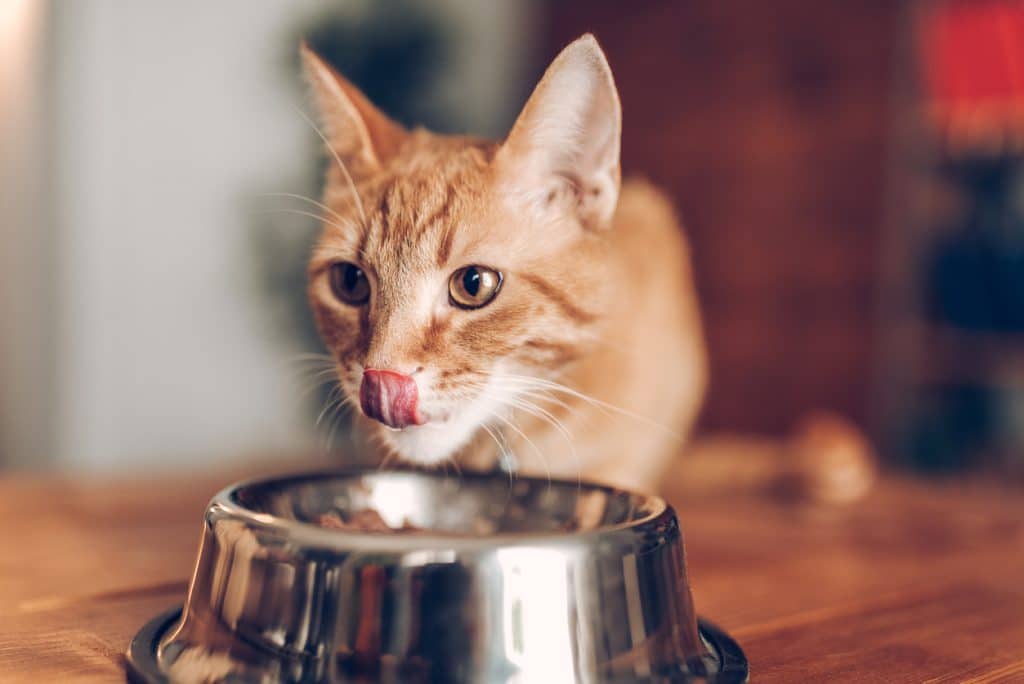
iStock/eclipse_images
Grinding during eating
If your cat is grinding their teeth while eating, it could mean they’re struggling to chew their food. You might see this with senior cats who have weaker teeth and find dry kibble too hard to chew.
Dehydration
Because dehydration can cause acid reflux in cats, a parched kitty may also grind their teeth. Additional symptoms of a dehydrated cat include lethargy, weakness, loss of appetite, and dry mucous membranes. Since it can lead to a host of issues well beyond teeth grinding, make sure your cat always has access to fresh water.
Nausea
If your cat is feeling queasy, they might grind their teeth as a way to deal with the discomfort. And while the occasional hairball being thrown up now and then isn’t alarming, it’s not normal for a cat to vomit on a regular basis. Watch your cat to see if they are lethargic or avoiding food, which could indicate a more serious GI problem.
Irritable bowel syndrome
IBS is a chronic inflammation of the GI tract that disrupts its ability to digest food properly. “A kitty with IBS may also feel nauseous and can be, in a sense, gritting their teeth to get through an abdominal cramp or bout of nausea,” reports Megan Conrad, BVMS, a veterinarian working with pet telehealth service Hello Ralphie. Cats suffering from IBS may also experience diminished appetite, weight loss, diarrhea, and lethargy. You can talk to your vet about adding a probiotic supplement to your cat’s routine to boost their immune system and help them digest food.
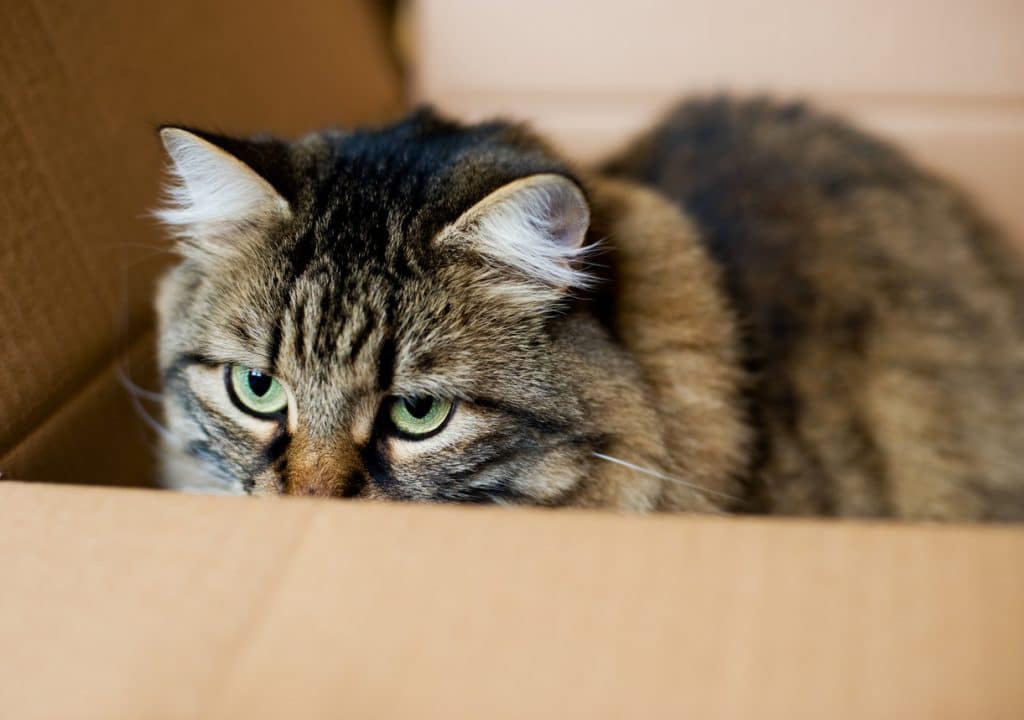
iStock/CARAAZUL
Anxiety
While anxiety isn’t the most common cause of bruxism in cats, stressful events (such as moving, a new pet in the house, illness, or aging) can trigger the condition. If nerves are to blame, you may also witness crying, hiding, trembling, diminished activity, loss of appetite, escape attempts, potty accidents, and destructive behavior.
Low potassium
Potassium is an electrolyte essential for healthy muscles and nerve function. Hypokalemia, or low levels of Potassium in your cat’s blood, can cause a slew of issues, such as teeth grinding, muscle weakness in the neck, an inability to raise the head, loss of appetite, and constipation. Fur quality may also suffer.
Neurological problems
Nervous system disorders, like epilepsy, may cause bruxism. “Cats who have neurological conditions that result in mild focal seizures (limited to one side of the brain and body) may grind their teeth,” Dr. Conrad explains. When cats experience a seizure, their body will shake uncontrollably—including their teeth.
Cancer
Painful oral tumors can also cause teeth grinding. The Feline Health Center at Cornell lays out symptoms that suggest oral cavity cancer, including a decline in appetite (especially hard food), weight loss, drooling, difficulty swallowing, bad breath, facial swelling, and swollen gums.
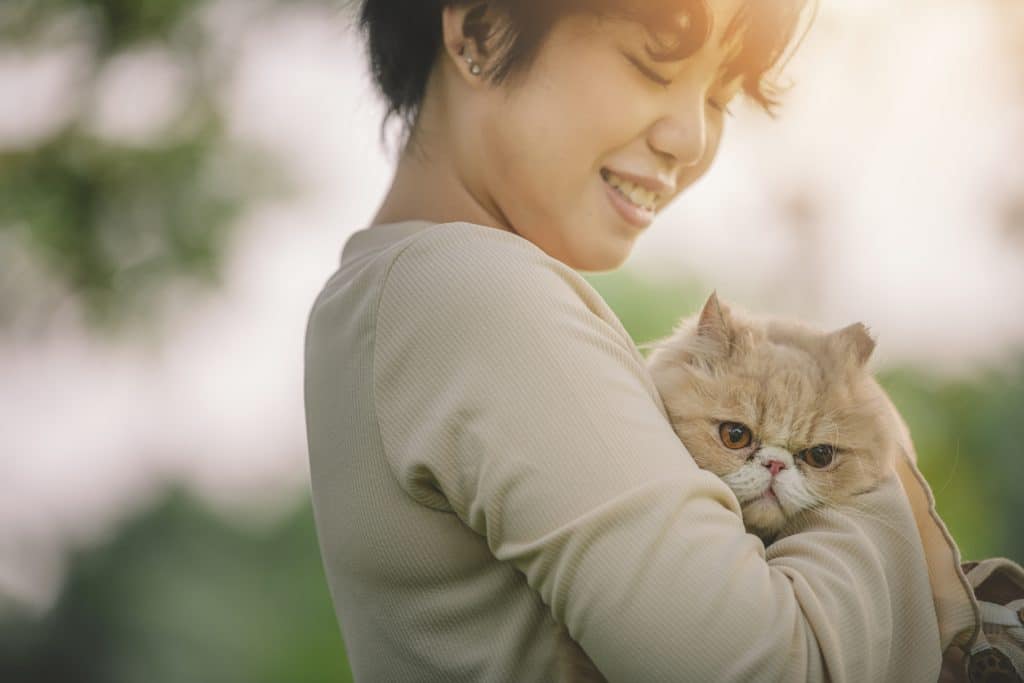
iStock/Edwin Tan
Treatments for Cat Teeth Grinding
Since most cases of feline teeth grinding are due to underlying medical issues, the behavior will go away once those conditions are treated, Dr. Conrad tells us. “Treatments will be recommended based on the most likely cause of the issue,” she says. “If there are painful resorptive lesions, those teeth are usually extracted and the other teeth cleaned. Medication can be given for any mouth infections, masses can be removed, and if there are misaligned teeth this can be corrected as well.”
For chronic conditions like IBS or epilepsy, your vet will make up a treatment plan. “Pain medications are available to help manage your kitty’s pain and get them feeling better,” Dr. Conrad reassures us.
What can cat owners do to prevent teeth grinding? A few habits will go a long way towards protecting your cat’s oral health:
- Brush your cat’s teeth: practicing good dental hygiene will prevent periodontal disease—and the unpleasant side effects that follow. Aim for 2-3 brushings per week.
- Feed your cat the right food: A cat’s teeth may weaken over time, which can make chewing through hard kibble a challenge. Consider switching your older kitty to wet food or softening their dinner with a gravy topper. And be sure to give your cat an age-appropriate diet intended for senior cats.
- Visit your vet: Routine wellness checkups can catch issues before they worsen. And, of course, any abnormalities should be addressed by your vet, says Dr. Conrad. “Since teeth-grinding is usually due to your cat being in pain or discomfort, speak to a vet as soon as possible so you can get a diagnosis and treatment.”
How Do Vets Diagnose Teeth Grinding?
First, your veterinarian can perform a COHAT, or a Comprehensive Oral Health Assessment and Treatment, to rule out oral problems as the cause.
“Your vet should do a thorough oral exam to check for periodontal disease, loose teeth, feline resorptive lesions, tumors, abnormal tooth alignment, or anything potentially causing mouth pain,” Conrad explains. Sometimes a more thorough examination with anesthesia is required, she adds. “If there are no obvious mouth concerns, dental x-rays under anesthesia may be recommended to check under the gums and evaluate tooth roots. Anesthesia also allows a more thorough oral exam since the animal is asleep.”
If your cat’s mouth gets a clean bill of health, your vet will want to investigate other possible causes. “Once oral problems have been ruled out, diagnostics such as lab work or ultrasound might be used to find a different source of pain that’s behind the teeth grinding,” Dr. Conrad informs us.
Takeaway:
The good news is that most dental problems, bruxism included, are preventable. With regular teeth brushing, routine vet visits, and plaque-blasting treats, your kitty can enjoy good dental health for years to come.
